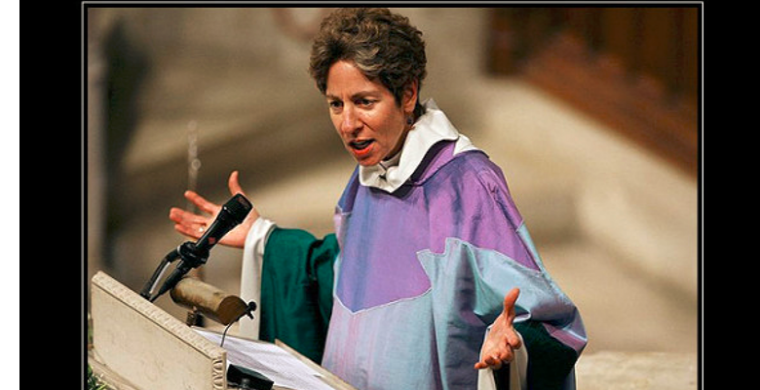Presiding Bishop Tells the Episcopal Church to Get Up and Dance
By Michael Heidt in Salt Lake City
VOL Special Correspondent
www.virtueonline.org
June 29, 2015
"Get up and dance!" proclaimed Katharine Jefferts Schori, in what might be her last major sermon as Presiding Bishop of the Episcopal Church. Preaching to delegates at the church's 78th General Convention's United Thank Offering Eucharist, Jefferts Schori laid into critics of her denomination, calling them "finger-waggers," and claimed that her church is "rising from the dead."
After comparing the Episcopal Church to the bleeding woman who was cured by Jesus in Mark's Gospel, Jefferts Schori attacked her denomination's detractors:
"We have lived for too long like that shamed and bleeding woman," she stated, "She's had to endure finger-waggers blaming her for her own illness. Anger and anxiety over membership loss in this church has frequently prompted finger-waggers to use that image of unstoppable hemorrhage -- and it's been going on for almost exactly 12 years, since we began to tell the truth about who we were and are and are meant to be."
The outgoing Presiding Bishop then claimed that the Episcopal Church's bleed-out had been stopped by church members touching "Jesus' robe" and seeing God at work in "new contexts."
"We have consulted plenty of ecclesiastical doctors, without much relief -- until we began to find the temerity to reach out and touch Jesus' robe. It's the same Temple-filling hem we heard about on Friday. The bleeding began to be staunched when we found the courage to reach out and touch the face of God, to see God at work in new contexts, and to have the confidence to claim our experience of the divine presence," opined the Episcopal Church's top bishop.
Jefferts Schori went on to list a series of areas in which the Episcopal Church has been active, such as the mistreatment of women, human trafficking, and hurricane relief in New Orleans, along with gun violence, and small church ministry. For Jefferts Schori, these provided contexts in which Episcopalians could find new life in their church. The Presiding Bishop believed that this was particularly evident in what she called a "war" that guns were fighting against "the innocent" in the United States.
"We are beginning to see," declared Jefferts Schori, "New life in the bleeding one as we confront the violence around us, particularly the war that guns are unleashing on the innocent in these United States. We will see the body rise as we address the death and violence that continues to be perpetrated here and around the world."
As an example of the Episcopal Church finding "new life" by "crossing old boundaries and exploring new territories," Jefferts Schori described the ministry of a 25-member church in Washington State, St. James, Cathlamet. This church had been "supporting the life and healing of children, youth, parents, and domestic violence victims for 30 years," she said.
After drawing attention to the charitable work of United Thank Offering, and other agencies, the Presiding Bishop returned to her theme of new life by "crossing into new territories," such as back yards and parks: "Mother Church will continue rising from the dead," she proclaimed, "If we keep crossing into new territories, in our back yards, prisons, city parks, and pockets of despair, here and across the globe. If we believe, if we're faithful, we know that the ancient truth remains, and resurrection is always emerging from death. That healing may cost plenty of blood, sweat, and tears -- but it is rooted in the firm belief that God does enlighten, heal, and deliver."
In conclusion, Jefferts Schori returned to finger-waggers and appealed to her listeners to dance. "Pay no attention to the finger-wagging," she said, "Get up, girl -- and boy, and woman and man -- get up and dance!"
Despite Jefferts Schori's claim that the Episcopal Church is rising from the dead, the numbers tell a different story.
From 2003-2013, the last year of statistical reporting, the denomination's average Sunday attendance dropped from 858,589 to 657,102 persons, an alarming decline of 23.5%. During the same timeframe, all of the church's nine Provinces lost Sunday worshippers: Province 1 by 27%, Province 2 by 19.2%, Province 3 by 26.8%, Province 4 by 17%, Province 5 by 28%, Province 6 by 25.2%, Province 7 by 27.2%, Province 8 by 25.9%, and Province 9 by 17.2%.
Some of the declining denomination's dioceses have hemorrhaged worshippers more than others. For example, the Diocese of Northwest Texas, not large to begin with, lost 40% of its Sunday attendance between 2003 and 2013, falling from 8,007 persons attending church on any given Sunday, to an average attendance of 3,806 in 2013. The Diocese of Tennessee, on the other hand, only lost 9.9% of its Sunday attendance during the statistical period, falling from 6,373 worshippers to 5,745.
Again, as of 2013, only 4% of the denomination's 6,622 congregations reported an average Sunday attendance of 300 or more, while 69% averaged 100 or less. Median attendance, across the board, was 61 persons.
During the same decade of decline, the Episcopal Church vigorously crossed into "new territories," most notably championing an LGBT agenda that included consecrating openly gay and lesbian bishops, as well as same-sex unions.
This year's General Convention looks set to continue the Episcopal Church's boundary crossing trajectory into the new world of gay advocacy. If the last decade's worshiping trend continues, too, then there will be few people left in the denomination to wag the finger at, much less dance.
Fr. Michael Heidt is Editor of Forward in Christ magazine and a priest in the Diocese of Fort Worth














